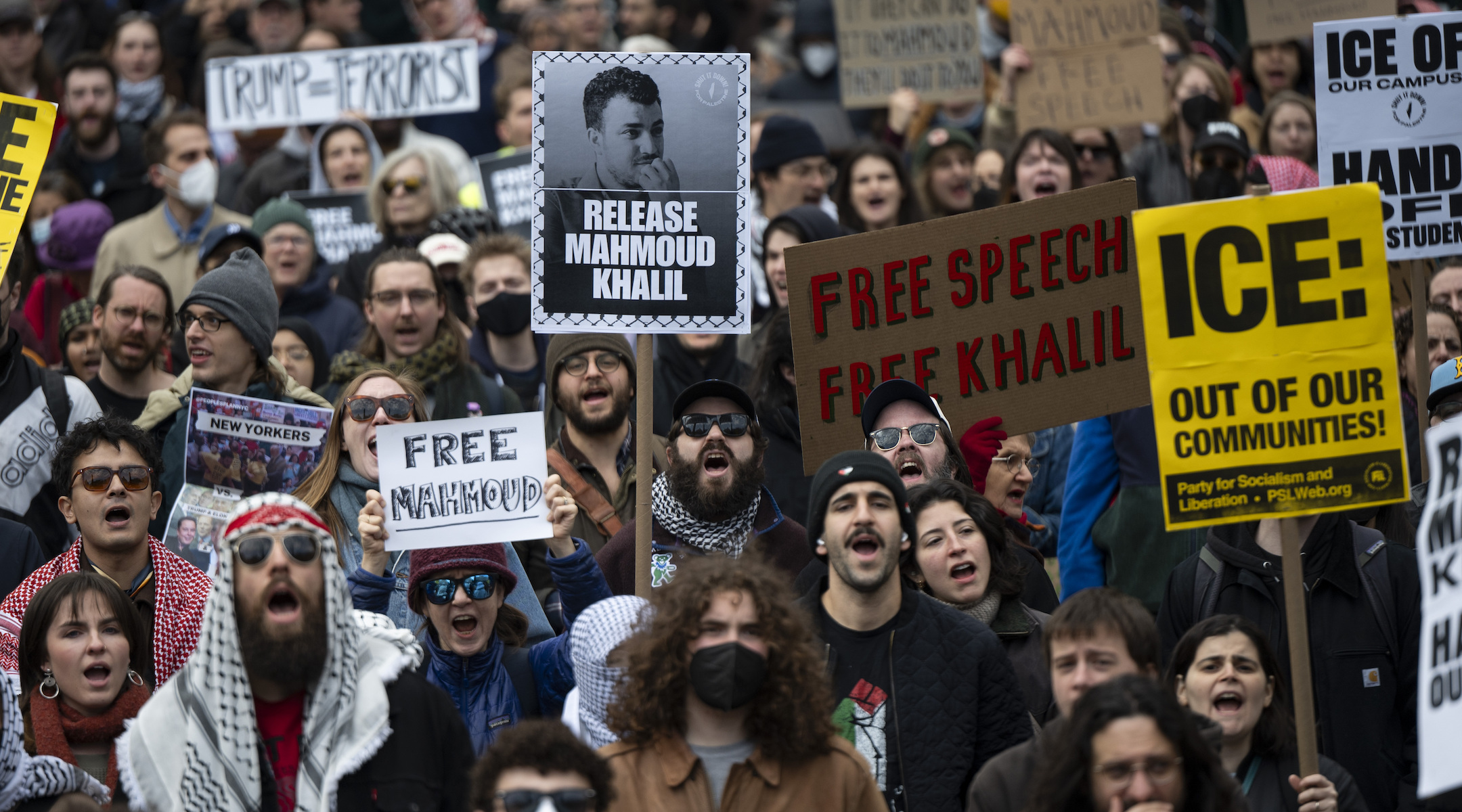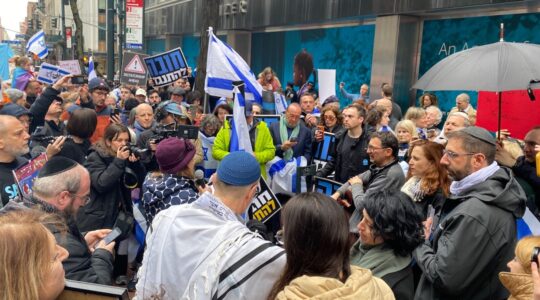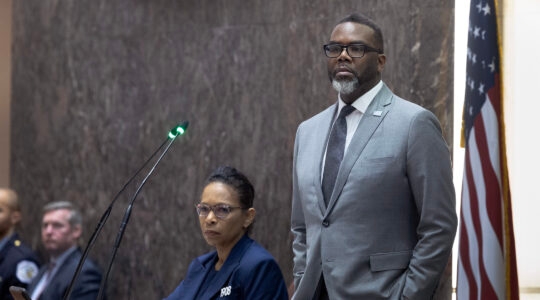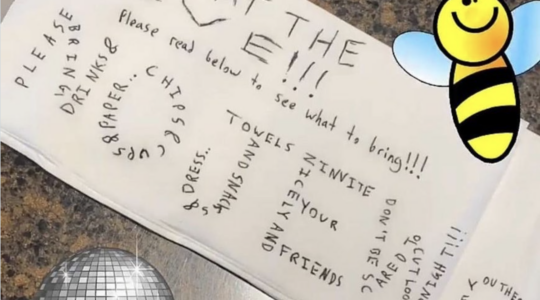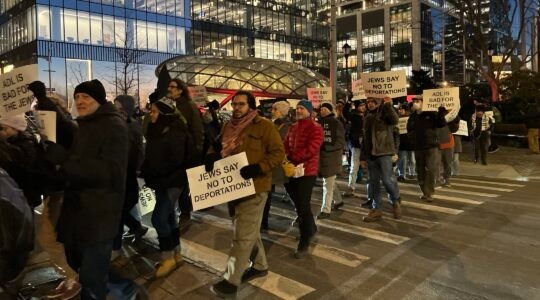Mahmoud Kahlil accused Columbia University of creating a “manufactured public hysteria about antisemitism” and likened the school to a Nazi collaborationist government in a letter dictated from an ICE detention center.
He also claimed, without citing evidence, that fellow students who spoke out against antisemitism were serving in the Israeli military during school vacations.
The letter, published Friday in the Columbia Spectator, the student newspaper, is Khalil’s second since he was arrested on campus by ICE nearly a month ago. Khalil, a Syrian-born Palestinian and recent graduate of Columbia, was a leader of protests against Israel and among the first and most prominent student activists to be arrested in the Trump administration’s campus crackdown. He is now fighting deportation in court.
The letter was published as conflict over student activism has continued to play out at Columbia. Last month several plaintiffs, including Khalil and Columbia students, filed a lawsuit seeking to block the school from sending a House committee its disciplinary records. A federal judge ruled Friday that the school must give students 30 days’ notice before handing over any documents.
Prior to the order, a group of mostly Jewish protesters chained themselves to gates on Columbia’s campus Wednesday demanding to learn more about whether the school had provided information to the federal government that led to Khalil’s arrest.
The student protesters were physically removed from the gates by public safety officers, who The New York Times reported have been newly empowered to stop campus protests. Columbia has pledged to add 36 “special patrol officers” with arrest powers to its ranks in March in response to the Trump administration’s demands that it do more to fight antisemitism.
As in his first letter from ICE detention on March 18, Khalil accused Columbia of “laying the groundwork for my abduction” by exercising “repression” of pro-Palestinian students. In Friday’s letter, while writing about the recent resignation of Columbia’s acting president, he called the school “Vichy on the Hudson,” a reference to the Nazi collaborationist government in France.
“The logic used by the federal government to target myself and my peers is a direct extension of Columbia’s repression playbook concerning Palestine,” he wrote. “In the 18 months since the genocidal campaign in Gaza began, Columbia has not only refused to acknowledge the lives of Palestinians sacrificed for Zionist settler colonialism, but it has actively reproduced the language used to justify this killing.”
Khalil wrote that the school pursued its policies “under the auspices of combating antisemitism.” Many Jewish students, as well as Jewish organizations on and off campus, have said that campus pro-Palestinian demonstrations created a hostile atmosphere for Jewish students, and groups have reported a rise in campus antisemitic incidents.
In his letter, Khalil suggested that those worries were artificial, and that conflicts were instigated by pro-Israel students. He referenced an article in The Intercept, a left-leaning publication, about a groupchat of pro-Israel alumni that allegedly worked to identify and report student protesters to law enforcement.
“In a cruel irony, the students who publicize manufactured safety concerns regarding antisemitism are the same ones who repeatedly show up at your events looking for provocation, leaving only disappointed,” wrote Khalil.
Khalil further accused pro-Israel students of “participating in the genocide as military personnel during their school breaks, only to return to campus and claim victimhood in the classroom.” Israel has denied the accusation that it is committing genocide in Gaza.
Khalil did not cite any evidence of enlisted IDF soldiers going back-and-forth to Columbia, though some Israeli students left Columbia mid-semester to serve in the military shortly after Hamas’ Oct. 7, 2023 attack. The university, as a policy, does not comment on individual students due to privacy laws.
Khalil’s detention in March presaged a broader crackdown on elite campuses by the Trump administration, which has portrayed many of its actions as part of an effort to combat antisemitism. Since Khalil’s arrest, a growing number of pro-Palestinian student activists have been threatened with deportation or detained by ICE.
On Sunday, Columbia announced that four international student visas had been terminated. A reason for the revocations was not immediately clear.
A number of Ivy League schools, including Columbia, have had hundreds of millions of dollars frozen by the Trump administration. Jewish groups and leaders have increasingly expressed concerns that the administration’s response to campus antisemitism is hurting higher education and infringing on civil liberties.
In the letter, Khalil also charged Columbia with being an “arm of the state,” writing that the school had “systematically gutted every value it claims to uphold.” He also called on students to join the protests, warning that “neutrality on Palestine will not protect you.”
“This institution’s singular concern has always been the vitality of its financial profile, not the safety of Jewish students,” wrote Khalil. “This is why Columbia was all too happy to embrace a superficial progressive agenda while still disregarding Palestine, and this is why it will soon turn on you, too.”
JTA has documented Jewish history in real-time for over a century. Keep our journalism strong by joining us in supporting independent, award-winning reporting.
